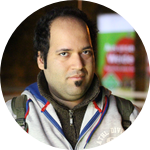About This Project
“Evening men”, who go to bed and get up late, have more sexual partners and more extra-pair matings than “morning men”, who get up early and go to bed early. Evening people are often nicknamed "Owls", and morning people "Larks".
This is related to testosterone: evening types have a higher testosterone level. Does evening type signal good genes? To test this, we want to assess immunocompetence and sperm quality as surrogates of good genes and compare evening with morning types.
Ask the Scientists
Join The DiscussionWhat is the context of this research?
Men with high testosterone levels and a “later” sleep behavior have a higher mating success. We want to know if this is is this related to the good genes hypothesis.
https://en.wikipedia.org/wiki/...
Studies show relations between morningness and higher business (https://hbr.org/2010/07/defend...) and school success but also between eveningness and higher mating success (our previous study). But why is mating success higher in evening types? Is there a biological explanation? Is it related to evolution. Is it the "good genes"?
We want to assess surrogates of good genes and compare them between evening types and morning types. This will be set in relation with salivary testosterone as well as sleep behavior and a battery of questionnaires about sexual behavior.
What is the significance of this project?
These questions have never been tested before. We apply evolutionary theory (the good genes hypothesis) to human behavior. We try to emulate animal studies that showed relationships between testosterone, mating success and "good genes", but transfer the question to humans.
Three of our previous studies showed that this eveningness behavior is indeed related to a different sexual behavior.
When evening people have a higher mating success, this should be related to biological findings. So, the good genes might be an explanation. How can we test this? Good genes cannot be easily measured, so we need surrogates. Therefore, we measure sperm quality, testosterone and a marker of health.
We test correlations between eveningness and these measures.
What are the goals of the project?
We hope to get insight into the human mating system with a focus on sleep behavior (in the sense of morningness-eveningness) and to assess, if the higher mating success of evening types is related to their quality (health, sperm quality).
This work is of great interest. If we can show this relationship, we get new insights. Usually, morning people "rule the world" (http://www.standard.co.uk/life...), but the "winners" in evolutionary terms might be the evening people with a higher mating success.
This would show that different types (morning versus evening) have different profiles that are related to success in its widest sense.
Budget
The testosterone is measured in saliva. The testosterone level can be related to sexual behavior and to evening orientation. So evening types have higher testosterone, which could explain the result. Measuring in saliva is easier than in the blood for our participants. This helps us to find men that are interested in the work.
To test the good genes hypothesis, we assess immunocompetence in saliva and make a spermatogram, to see, if evening types have a better health and more viable sperm. Sperm quality is a measure of "fitness" and of good genes. So we check the sperm to see if the evening men have more volume or higher quality (motiliy).
Immunocompetence shows how good the immune system of a person is. For this, we need assays of some immune markers.
The research assistant is needed to inform the people of our research, to get samples (saliva etc.) from the participants. The assistant should be a student because he will be able to communicate better with our population.
Endorsed by
Meet the Team
Christoph Randler
born 1969
PhD in 2003
2005 junior professor (assistant) Univ Educ Ludwigsburg
2006-2007 W2 professor Univ Leipzig
2007-2015 W 3 professor (full) Univ Educ Heidelberg
2016-now W 3 professor Univ Tuebingen
After having done "mainstream" research for many years, I now want to do some work that is not "traditionally" funded by usual organizations, so I am happy to be part of the Experiment. You can help me doing my work, exploring the cutting edge science - in between fields of biology and psychology. I like switching between the fields - I have done work on "real" birds, also on biology education (with the hope to improve school teaching). Now I am interested how our "neglected third" of our life - the sleep and sleep behavior is related to personality, society and health.
Arash Rahafar
I was born in 1988 in Tehran. My bachelor study was in clinical psychology, my master in psychometrics, and since 2014 I've started my PhD at University of Education Heidelberg at first, and then continued at University of Tübingen. I do my research mainly in the domain of circadian rhythms however I'm also occupied with interpersonal relationships topics and social psychology studies.
Corina Faßl
born 1990
2011-2014 BSc. (psychology)
the health and life sciences Univ
2014-2016 MSc. (psychology)
the health and life sciences Univ
PhD since 2016 Univ Tuebingen
After I have already dealt with chronobiology in my bachelor- and master thesis, I’m happy to get the chance to deepen this area of research (sleep behavior, in sense of morningness- eveningness). The combination of chronobiology with personality and sexual behavior will be a promising research.
Additional Information
One of the challenges of the project will be to find participants that agree to deliver data and material - we hope to fix this with the help of male student researchers.
Project Backers
- 8Backers
- 8%Funded
- $297Total Donations
- $37.13Average Donation








